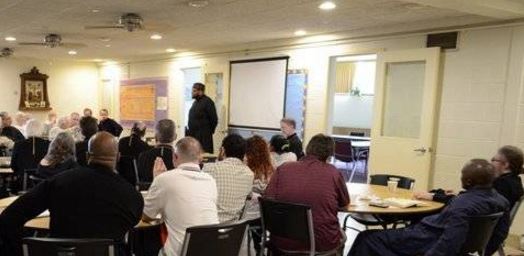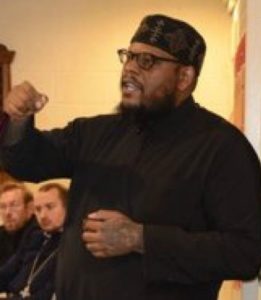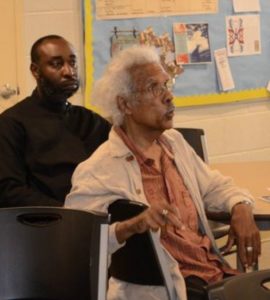
From the OCA Diocese of New York and New Jersey
“We would love to reach out to African-Americans in our community, but we don’t know how.”
“I don’t know where to begin.”
“I’m afraid we’ll be seen as too white and too exotic.”
“How do we merge the Black church and culture with [fill in Orthodox ethnic group of choice]?”
Sound familiar? Orthodox parishes across the country struggle with outreach to various ethnic groups — wishing to expand the parish’s evangelistic efforts in bringing Holy Orthodoxy to Blacks, Latinos, and Asians — but lacking the knowledge, insights, and tools to do so. With the biggest of hearts and greatest of desires, this area of evangelism … bringing and sharing Orthodoxy with ethnic minority groups … can nevertheless seem daunting enough to persuade many to never even begin the effort.
 To address these concerns and provide information, ideas, and tools to train and equip clergy and laity to begin effective outreach to African-Americans, the Diocese’s Commission on Mission and Evangelism sponsored a one-day training workshop called “Bringing the Orthodox Faith to the African-American Community.” Thanks to the gracious hosting of Saints Peter and Paul Church in Manville NJ on Saturday, 16 July 2016, the workshop brought together over 40 people from across two deaneries as well as outside of the diocese to hear and learn from two outstanding speakers on African-American outreach: Father Alexii Altschul (a founder of the Brotherhood of Saint Moses the Black), and Father Deacon Turbo Qualls (the Brotherhood’s Chapter Development coordinator).
To address these concerns and provide information, ideas, and tools to train and equip clergy and laity to begin effective outreach to African-Americans, the Diocese’s Commission on Mission and Evangelism sponsored a one-day training workshop called “Bringing the Orthodox Faith to the African-American Community.” Thanks to the gracious hosting of Saints Peter and Paul Church in Manville NJ on Saturday, 16 July 2016, the workshop brought together over 40 people from across two deaneries as well as outside of the diocese to hear and learn from two outstanding speakers on African-American outreach: Father Alexii Altschul (a founder of the Brotherhood of Saint Moses the Black), and Father Deacon Turbo Qualls (the Brotherhood’s Chapter Development coordinator).
 Father Deacon Turbo spoke first in the morning, following a Molieben (prayer service) for the “Beginning of Any Good Work.” He addressed a powerful theme: Orthodoxy is not “the White Man’s Religion” and was never imposed on Africans brought to America via the Trans-Atlantic Slave Trade (and, further, that Orthodoxy, unlike virtually all of Western Europe and Western Christianity, was never involved in the evil of such human trafficking). Rather, Orthodoxy is an historic African faith that has had roots in Africa since the time of the Apostles: the Acts of the Apostles notes the baptism of the Ethiopian eunuch by Saint Thomas; and Church Fathers, many of whom lived and were from northern African nations like Libya, Egypt, and Carthage.
Father Deacon Turbo spoke first in the morning, following a Molieben (prayer service) for the “Beginning of Any Good Work.” He addressed a powerful theme: Orthodoxy is not “the White Man’s Religion” and was never imposed on Africans brought to America via the Trans-Atlantic Slave Trade (and, further, that Orthodoxy, unlike virtually all of Western Europe and Western Christianity, was never involved in the evil of such human trafficking). Rather, Orthodoxy is an historic African faith that has had roots in Africa since the time of the Apostles: the Acts of the Apostles notes the baptism of the Ethiopian eunuch by Saint Thomas; and Church Fathers, many of whom lived and were from northern African nations like Libya, Egypt, and Carthage.
Father Alexii spoke in the afternoon about his experiences as a white man married to a black woman, raising a blended family, who ultimately found and embraced the ancient Orthodox Christian Faith. He began “Reconciliation Ministries” (now known as Reconciliation Services, it continues to serve the poor and marginalized of the Troost Avenue neighborhood of Kansas City). He, his late wife, and community started Saint Mary of Egypt Orthodox Church, now a parish of the Serbian Orthodox Church in North America.
After deliberating further opportunities for mutual discussion and networking, the workshop ended with another Molieben “For the Cessation of Strife” as found in the Great Book of Needs, Volume IV.
Plans are underway for more conferences in this outreach series beginning later this year.

Fr. John,
The above story here makes the claim:
“Orthodoxy is not “the White Man’s Religion” and was never imposed on Africans brought to America via the Trans-Atlantic Slave Trade (and, further, that Orthodoxy, unlike virtually all of Western Europe and Western Christianity, was never involved in the evil of such human trafficking). ”
IMHO this is a little misleading. “Human trafficking” or slavery was a part of the Eastern Roman (Byzantine) empire. They were mainly prisoners of war. This had come down from Roman tradition. The difference is they didn’t discriminate. Many are unaware that the term “slave” itself comes from the Latin “sclavus” and Greek “sklabos” meaning “Slav.” According to the dictionary the term was used in the 9th century when the Holy Roman (Charlemagne’s) Empire enslaved Slavs when expanding into their lands.
Though the Eastern Empire was not involved in the Trans-Atlantic slave trade, to say Orthodox Christians were not “involved in the evil of such human trafficking” gives the appearance that slavery was not a part of Byzantine society.
In XC,
David Sanders
I think the author’s point is exactly as you said it, Orthodox Christians/the Eastern Empire were never involved in the Trans-Atlantic slave trade.
Thanks for the clarification. You know how things get misconstrued these days. ;o)
Indeed, I do. Thanks for writing!
Finally somebody admitted that he does not know how to reach out to the black communities. This is a very good start. I’m black and I don’t know how to reach out to them.
Maybe a good start would be to stop calling us “African Americans.” We are Americans or we are Africans. I am an American and proud to be one, especially after serving on the Altar with a man who was sentenced to eight years of hard labor behind the Iron Curtains and working with a man who escaped from Romania and worshiping with a priest who escaped from Bulgaria. I know nothing about Africa and I have little or not interest in Africa. Why do you call me an African American when I am fifth generation but you call my brothers and sisters Americans who are first to fifth generation?
I think that we need to reac out to individuals, not to communities. I am Orthodox today because a Ukrainian Catholic classmate of mine introduced me to his church when I was in grammar school. It was this one-on-one encounter that made the difference in my case.
A mistake that many of us do make is to assume that a black person who is Orthodox is Ethiopian. To compound the situation, we presume that he is interested in the Ethiopian or Coptic Church. He presume that he is Democrat or likes a certain type of noise called music and that he likes certain food. We make assumptions about him without knowing him as a person. Don’t assume anything.
Also keep in mind that blacks in Baltimore are different than blacks in New Hampshire [if you can find any]. In other words, urban blacks are different than non-urban blacks. The environments are different. Educated blacks are different than those who drop out of high school.
Amen and amen.